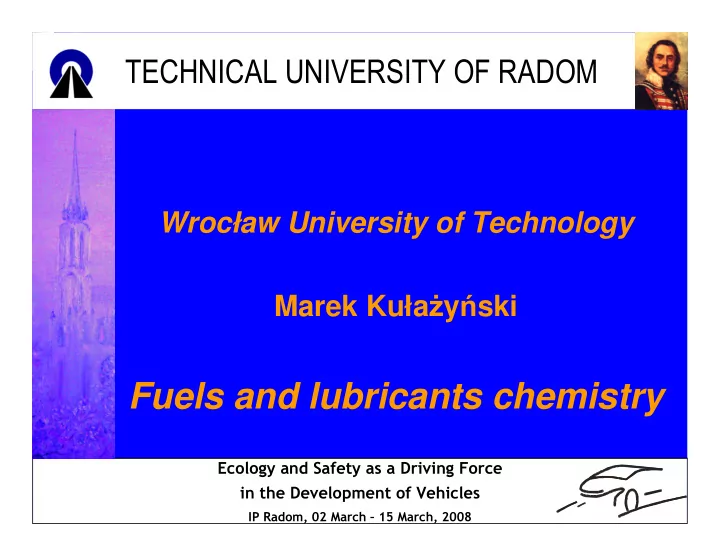

����������������������������� Wrocław University of Technology Marek Kuła � y � ski Fuels and lubricants chemistry �������������������������������������� ������������������������������ ������������������� !"�����������#
������������������������������ Place for presentation max: 30 pages �������������������������������������������������������������������� ������������������� !"�����������#
������������������������������ Place for presentation max: 30 pages �������������������������������������������������������������������� ������������������� !"�����������#
������������������������������ �������������������������������������������������������������������� ������������������� !"�����������#
������������������������������ ��������������������������� � $������ � %�������� � �����������&��������������� � '������(&�)�� � ��������*������$&� � ���&����� � +��,��� � %������� � ������� � '������� � �&���&� �������������������������������������������������������������������� ������������������� !"�����������#
����������������� � ���������������� Changes in gasoline properties and composition can help reduce vehicle emissions. Certain gasoline modifications are very effective in enabling vehicle emissions control systems to perform at their optimum levels. But other gasoline modifications are not nearly as effective at reducing emissions compared to the use of the vehicle emission control systems. The explanations here apply chiefly to vehicles built since 1985. Sulphur � Sulphur oxides in the exhaust gases, becomes poison the three-way catalyst. � Reducing sulphur content in gasoline increases converter efficiency and decreases VOC, CO, NOx, and toxics emissions. � Reducing the sulphur content also reduces the direct emission of sulphur dioxide — a criteria pollutant. �������������������������������������������������������������������� ������������������� !"�����������#
����������������� � ���������������� Vapor Pressure Decreasing the vapor pressure of gasoline reduces evaporative VOC emissions and to a lesser extent can reduce exhaust VOC and CO. Oxygenates � CO is the result of incomplete combustion and its formation is very dependent on the Air/Fuel. In older cars, adding oxygenates to gasoline has the same effect as increasing the amount of combustion air. It adds more oxygen to the combustion chamber, makes combustion more complete, and reduces formation of carbon monoxide. �������������������������������������������������������������������� ������������������� !"�����������#
����������������� � ���������������� � ������������������������������������������� ����������������������������������������������� ������������������������������� ���������������� �����!�������"� � ('-������������������������)���-������-����� ��������������)&��������������&���. /���������������������������)��0�����-��������� ����������('-���&����1����������������������� �-������������������������������&��������������� ����.2������3. �������������������������������������������������������������������� ������������������� !"�����������#
����������������� � ���������������� � The emissions benefit of oxygenates was greatest in pre-1990 vehicles with less effective A/F control systems. The closed- loop A/F control systems in newer vehicles have become progressively better and better over time. � By adjusting intake A/F based on the oxygen content of the exhaust, these systems decrease intake air to compensate for oxygen in the fuel, negating most of the emissions benefit associated with having oxygenate in the gasoline. The addition of adaptive learning systems has improved A/F control even more. � Consequently, oxygenates seem to have little effect on exhaust emissions from these newer vehicles, so long as they are operating in closed-loop mode. �������������������������������������������������������������������� ������������������� !"�����������#
Recommend
More recommend